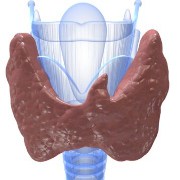Symptoms
Symptoms come on slowly. They may be mistaken for stress. As the thyroid becomes more overactive, symptoms may include:
- Fatigue
- Unexplained weight loss with increased appetite
- Restlessness
- Changes in libido
- Muscle weakness and wasting, especially in the elderly
- Heat intolerance
- Tremors
- Enlarged thyroid gland ( goiter )
- Heart palpitations
- Increased sweating
- Nervousness
- Irritability
- Redness, swelling, and protrusion of the eyes
- Lumpy, reddish thickening of the skin in front of the shins
- Shortness of breath
- Increased number of bowel movements
- Irregular or no menstrual period
- Heart failure or atrial fibrillation , especially in the elderly
- Swelling of hands, face, and/or feet
- Muscle pain
- Hoarse sound to your voice
Diagnosis
The doctor will ask about your symptoms and medical and family history, and perform a physical exam. The exam usually reveals:
- Enlarged thyroid gland
- Rapid pulse
- Warm, moist skin
- Several of the symptoms listed above
Your doctor may order the following tests:
- Blood tests
- Thyroid stimulating hormone (TSH), currently the best screening test
- Free T4 and free T3
- Thyroid autoantibodies (TSH receptor antibody)
- Thyroid scan—may be needed to differentiate between Graves' disease and other causes
- Radioactive iodine uptake test—measures how active thyroid is in taking up the iodine
- Needle biopsy of the thyroid—may be needed
Please be aware that this information is provided to supplement the care provided by your physician. It is neither intended nor implied to be a substitute for professional medical advice. CALL YOUR HEALTHCARE PROVIDER IMMEDIATELY IF YOU THINK YOU MAY HAVE A MEDICAL EMERGENCY. Always seek the advice of your physician or other qualified health provider prior to starting any new treatment or with any questions you may have regarding a medical condition. Copyright © 2024 EBSCO Publishing All rights reserved.





